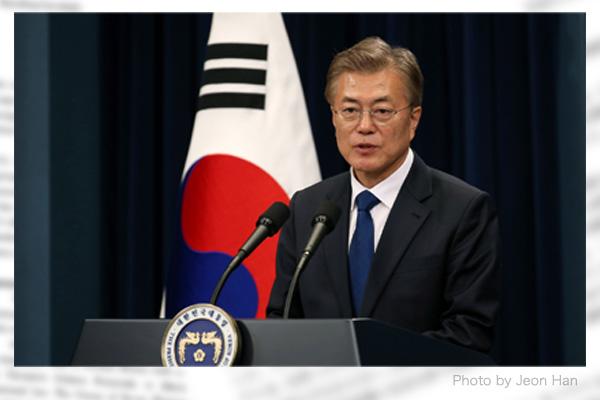Most Japanese media headlined South Korean President Moon Jae In’s speech on August 15 as calling for talks with Japan. After reading the full text of the speech and a congratulatory message by the chairman of the Korea Liberation Association (an organization of independence activists and their descendants) at a ceremony to commemorate Korea's liberation from Japanese rule, however, I can’t but conclude that it is almost impossible to normalize Japan’s relations with South Korea under President Moon.
Empty call for talks
President Moon said:
“Although the Supreme Court acknowledged the validity of the 1965 Claims Agreement between Korea and Japan, it ruled that the right of an individual to claim damages against unlawful acts had never been waived. A Supreme Court ruling has the highest legal authority and executory power within the Republic of Korea. My administration respects the judiciary's decision, and we have been engaging in consultations with the Japanese government on how to reach a satisfactory resolution to which the victims could agree. The door for such consultations remains wide open.”
Over wartime Korean workers in Japan, a lawsuit came in Japan earlier than in South Korea. The Japanese Supreme Court ruled in favor of Japanese companies. However, the South Korean Supreme Court denied the validity of the Japanese ruling as running counter to public order and morality. The Japanese and South Korean judiciaries have collided head on. International law, including treaties and agreements between countries, override domestic laws. No country can refuse to implement an international treaty or agreement for the reason of any domestic judicial ruling. Tokyo has repeatedly asked Seoul to resolve the violation of international law resulting from the South Korean Supreme Court decision. President Moon in his speech vowed to work with Japan to protect the principles of international law. However, Seoul is unilaterally responsible for protecting international law and does not have to work with Tokyo in doing so.
President Moon in the speech emphasized the significance of Korea’s liberation from Japanese rule on August 15, 1945, and of peaceful coexistence with North Korea, without mentioning the founding of the Republic of Korea on August 15, 1948. The Moon administration and its supporters have a historical view that the ROK founding was tainted.
Blatant anti-Japan stance
The message by Kim Won Wung, chairman of the Korea Liberation Association, blatantly showed this historical view. In a startling statement, the former National Assembly legislator said that South Korean people had resisted pro-Japanese anti-nationalist authorities from the Jeju uprising in 1948 (communists’ uprising against the ROK founding) to candle rallies in 2016 (demanding the resignation of then President Park Geun Hye). Following a U.S. military rule after the defeat of the Empire of Japan, the ROK government was established, he said, without using word “founded.”
Moreover, Kim said that Rhee Syngman (the first South Korean president) colluded with pro-Japanese collaborators, making South Korea the only country that has failed to liquidate nation’s traitors, and that the failure to liquidate pro-Japanese collaborators is a basic disease of South Korean society. He thus condemned South Korea’s modern history as tainted and branded anti-communist liberal democratic forces in South Korea as pro-Japanese and nation’s traitors.
On the same day, nearly 100,000 citizens rallied in central Seoul to denounce the Moon administration. While the city of Seoul banned the rally for the reason of preventing the novel coronavirus infection, those who participated in the rally despite torrential rains shouted that President Moon should be ousted and that Moon should not take over the country. As approval ratings for the Moon administration and the ruling party have rapidly declined, those vowing to vote for an opposition camp candidate if a presidential election is held now are outdoing ruling camp supporters. Anti-communist liberal democrats could win back the government. There is hope for the possibility.
Tsutomu Nishioka is a senior fellow and a Planning Committee member at the Japan Institute for National Fundamentals and visiting professor at Reitaku University. He covers South and North Koreas.


